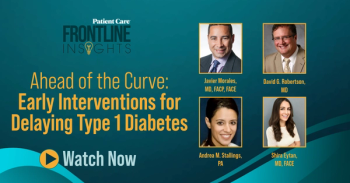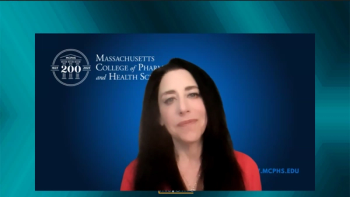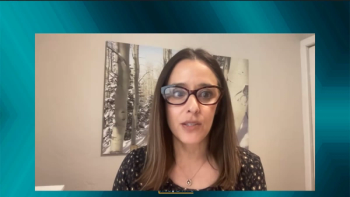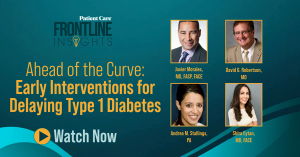Articles by Andrea Stallings, PA

Patient Selection for Teplizumab and Infusion Process
ByJavier Morales, MD, FACP, FACE ,David Robertson, MD,Andrea Stallings, PA,Shira Eytan, MD, FACE Panelists discuss how patient selection for teplizumab therapy requires careful screening for autoantibody positivity and preserved C-peptide function, followed by a 14-day outpatient infusion process that needs close monitoring for cytokine release syndrome and other potential adverse effects.

Clinical Trial Data for Teplizumab
ByJavier Morales, MD, FACP, FACE ,David Robertson, MD,Andrea Stallings, PA,Shira Eytan, MD, FACE Panelists discuss how teplizumab demonstrated efficacy in clinical trials by delaying type 1 diabetes onset in high-risk patients.

Mechanism of Action of Teplizumab in Delaying Onset and Progression of Type 1
ByJavier Morales, MD, FACP, FACE ,David Robertson, MD,Andrea Stallings, PA,Shira Eytan, MD, FACE Panelists discuss how teplizumab binds to T cells and modifies their function to preserve beta cell function, potentially delaying type 1 diabetes onset in at-risk individuals by an average of 2-3 years.

Screening for Autoantibodies in Type 1 Diabetes
ByJavier Morales, MD, FACP, FACE ,David Robertson, MD,Andrea Stallings, PA,Shira Eytan, MD, FACE Panelists discuss how screening for autoantibodies can help identify individuals at risk for type 1 diabetes before symptoms develop, enabling earlier intervention and potentially delaying disease onset.

Impact of Delayed Intervention In Stage 2 Type 1 Diabetes
ByJavier Morales, MD, FACP, FACE ,David Robertson, MD,Andrea Stallings, PA,Shira Eytan, MD, FACE Panelists discuss how delaying intervention during Stage 2 Type 1 diabetes increases the risk of diabetic ketoacidosis and complications at diagnosis, while also potentially accelerating beta cell destruction and reducing the window for preservation therapies.

Defining the Stages of Type 1 Diabetes
ByJavier Morales, MD, FACP, FACE ,David Robertson, MD,Andrea Stallings, PA,Shira Eytan, MD, FACE Panelists discuss how Type 1 diabetes progresses through distinct stages, from initial autoimmunity with normal blood glucose (Stage 1), to dysglycemia without symptoms (Stage 2), to clinical diagnosis with symptoms (Stage 3), marking critical intervention points for treatment and management.

Guidelines for Type 1 Diabetes Screening
ByJavier Morales, MD, FACP, FACE ,David Robertson, MD,Andrea Stallings, PA,Shira Eytan, MD, FACE Panelists discuss how screening for Type 1 diabetes should focus on identifying high-risk individuals through family history, genetic markers, and autoantibody testing, while emphasizing the importance of early detection to prevent diabetic ketoacidosis at diagnosis.

Assessing the Burden of Type 1 Diabetes
ByJavier Morales, MD, FACP, FACE ,David Robertson, MD,Andrea Stallings, PA,Shira Eytan, MD, FACE Panelists discuss how Type 1 diabetes imposes significant physical, emotional, and financial burdens on patients through the lifelong need for insulin therapy, blood glucose monitoring, lifestyle modifications, and management of potential complications.

Key Insights and Practical Tips: Wisdom from UCSD Practitioners for Effective T1D Management
ByJennifer D. Goldman, RPh, PharmD, CDCES, BC-ADM, FCCP,Steven Edelman, MD,Andrea Stallings, PA,Schafer Boeder, MD The panel of experts from UCSD concludes the discussion on delaying the onset of stage 3 T1D by providing key takeaways and clinical advice on the treatment of patients with this condition.

Teplizumab Infusion Protocol: Clinical Processes and Strategies for Infusion Access Enhancement
ByJennifer D. Goldman, RPh, PharmD, CDCES, BC-ADM, FCCP,Steven Edelman, MD,Andrea Stallings, PA,Schafer Boeder, MD Focusing on the utilization of teplizumab, the expert panel from UCSD shares insights in how to select patients for this treatment and provide practical tips for the infusion process, and infusion location options.

Exploring the TN-10 Teplizumab Clinical Trial: Patient Demographics and Efficacy Insights
ByJennifer D. Goldman, RPh, PharmD, CDCES, BC-ADM, FCCP,Steven Edelman, MD,Andrea Stallings, PA,Schafer Boeder, MD The panel reviews the TN-10 trial investigating teplizumab, focusing on patient inclusion criteria, patient outcomes, and adverse reactions.

Exploring the First FDA-Approved Treatment to Delay T1D Onset: Mechanism of Action and Treatment Impact
ByJennifer D. Goldman, RPh, PharmD, CDCES, BC-ADM, FCCP,Steven Edelman, MD,Andrea Stallings, PA,Schafer Boeder, MD Diabetes specialists from UCSD discuss teplizumab, the first FDA-approved drug for delaying onset of T1D, highlighting its benefits and mechanism of action.

Understanding Autoantibody Screening Tests: Methods, Interpretation, and Analysis Practicalities
ByJennifer D. Goldman, RPh, PharmD, CDCES, BC-ADM, FCCP,Steven Edelman, MD,Andrea Stallings, PA,Schafer Boeder, MD Schafer Boeder, MD and Andrea Stallings, PA delve into the intricacies of autoantibody screening tests for T1D with detailed insights on their methodologies, interpretation nuances, and practical analysis considerations.

Navigating T1D Risk Screening: Identifying Ideal Candidates, Understanding Autoantibodies, and Determining Timing for Rescreening
ByJennifer D. Goldman, RPh, PharmD, CDCES, BC-ADM, FCCP,Steven Edelman, MD,Andrea Stallings, PA,Schafer Boeder, MD Following a couple of audience polling questions, Andrea Stallings, PA and her UCSD colleagues, comment on identifying suitable candidates for T1D screening, understanding autoantibodies involved in this condition, and determining when to rescreen those at risk for disease progression.

The Crucial Impact of Early Intervention in Preventing T1D Stage Progression
ByJennifer D. Goldman, RPh, PharmD, CDCES, BC-ADM, FCCP,Steven Edelman, MD,Andrea Stallings, PA,Schafer Boeder, MD Addressing the significance of acting early in T1D care, a group of diabetes experts delve into the impact of delaying intervention during stage 2 of the condition.

The Vital Importance of Understanding and Addressing Training Gaps in Endocrinology Surrounding T1D Stages
ByJennifer D. Goldman, RPh, PharmD, CDCES, BC-ADM, FCCP,Steven Edelman, MD,Andrea Stallings, PA,Schafer Boeder, MD Schafer Boeder, MD and his colleagues provide a comprehensive overview of the stages of T1D in patients with diabetes, highlighting the various signs and symptoms associated with each stage.

Insights into the Burden of T1D: Genetic Links and Familial Considerations from UCSD Practitioners
ByJennifer D. Goldman, RPh, PharmD, CDCES, BC-ADM, FCCP,Steven Edelman, MD,Andrea Stallings, PA,Schafer Boeder, MD A panel of experts on diabetes management introduce themselves and provide an overview of the condition, highlighting risk factors, disease burden, and the benefits of collaborative care.







